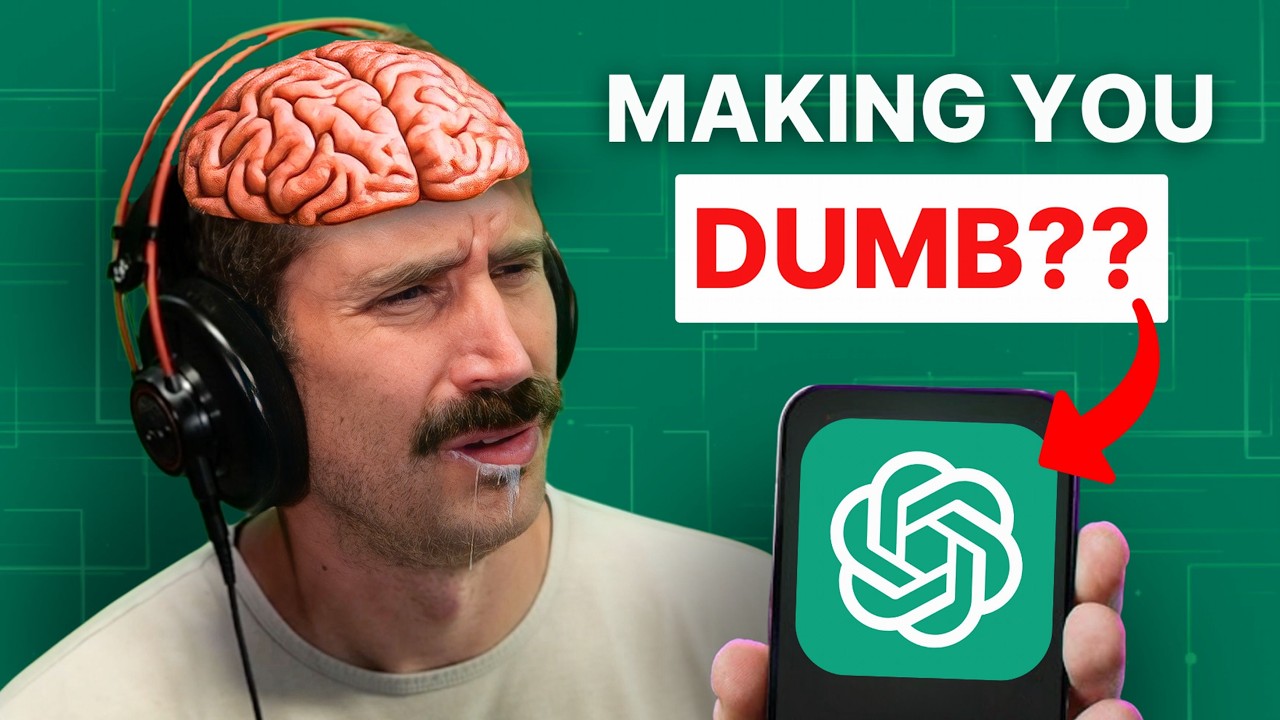The video highlights a study showing that heavy reliance on AI tools like ChatGPT can diminish cognitive effort, memory retention, and creativity, potentially leading to long-term cognitive decline or “cognitive debt.” While AI boosts productivity by handling routine tasks, the video urges mindful, balanced use to preserve deep thinking, learning, and genuine understanding, especially in education and society.
The video discusses a recent MIT brain scan study examining the cognitive effects of ChatGPT and AI usage on users over four months. The study reveals that while AI tools like ChatGPT can increase productivity by speeding up task completion, they simultaneously reduce the cognitive effort and brain activity involved in learning and problem-solving. Specifically, users relying heavily on AI showed significantly lower neural connectivity and engagement in brain regions associated with creativity, memory, and executive function compared to those who wrote essays or solved problems without AI assistance. This suggests that AI use may lead to cognitive atrophy, where the brain’s capacity to think deeply and critically diminishes over time.
One striking finding was that 83.3% of participants using AI tools could not accurately recall or quote from essays they had just written minutes earlier, indicating a fragmented sense of ownership and cognitive agency over their work. In contrast, participants who wrote without AI assistance demonstrated stronger memory retention and a greater sense of authorship. Teachers evaluating AI-generated essays described them as “soulless” and lacking personal insight, despite their polished language and structure. This highlights a growing concern that AI-generated content, while superficially flawless, may lack depth, creativity, and genuine understanding.
The video also explores the concept of “cognitive debt,” likening it to technical debt in software development. Each shortcut taken by relying on AI tools creates interest payments in the form of lost thinking ability and reduced mental effort. Over time, this can lead to learned helplessness, where individuals become dependent on AI and lose the ability or motivation to engage in independent critical thinking and problem-solving. The presenter emphasizes the importance of balancing AI use with deliberate practice of cognitive skills to maintain mental sharpness and avoid long-term cognitive decline.
Despite these concerns, the video acknowledges that AI tools have undeniable benefits, such as reducing frustration and effort in information retrieval and task completion. The key is strategic use: leveraging AI to handle routine or time-consuming tasks while reserving time for deep thinking, learning, and creativity. The presenter suggests setting aside dedicated periods without AI assistance to exercise the brain’s cognitive faculties, much like physical exercise strengthens muscles. This approach can help users retain ownership of their work and foster genuine understanding rather than superficial fluency.
Finally, the video reflects on broader implications for education, work, and society. It raises questions about how AI might affect the development of future experts and leaders if younger generations become overly reliant on AI tools without building foundational skills. There are concerns about potential impacts on critical thinking, creativity, and even political engagement, as people may become trapped in echo chambers or lose the ability to analyze complex issues independently. The takeaway is a call for mindful AI use that balances efficiency gains with the preservation of cognitive health and intellectual growth.
You can access the study by visiting this link on arXiv, where the preliminary results and implications are discussed.
